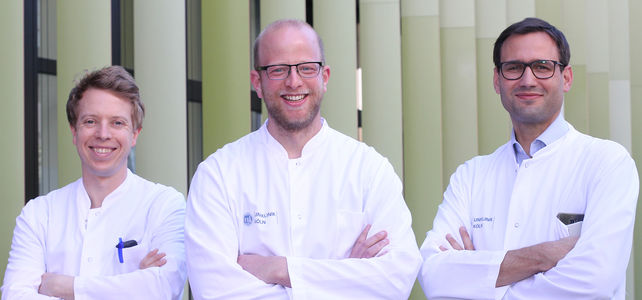SARS-CoV-2 infection causes severe inflammation of the lungs and other vital organs in some people. The reason why some infected people respond to the virus with an excessive immune response is still not well understood. In a new study, researchers at the University Hospital Cologne are focusing on the surface protein of SARS-CoV-2, the spike protein.
Spike protein activates the innate immune system
SARS-CoV-2 infection causes severe inflammation of the lungs and other vital organs in some people. The reason why some infected people respond to the virus with an excessive immune response is still not well understood. In a new study, researchers at the University Hospital Cologne are focusing on the surface protein of SARS-CoV-2, the spike protein. Spike protein is known above all as an important stimulus protein for so-called acquired immunity, protection through antibody formation and the basic building block of all vaccines.
The work of the Cologne researchers is now studying for the first time the effect of the spike protein on the innate immune system, the activity of which is also linked to the course of severe disease. The results have now been published in the popular scientific journal EMBO Molecular Medicine.
SARS-CoV-2 infection can lead to a massive release of inflammatory signaling substances, called cytokines, which in some patients lead to severe damage to internal organs and in a chain reaction that attracts more active defense cells to tissues. How the virus causes the release of cytokines is not yet well understood. Researchers in Cologne have now been able to show that human immune cells (macrophages) are significantly stimulated by the viral fork protein to produce the inflammatory signaling substance interleukin 1. However, this was only possible if the macrophages of COVID-19 patients were examined in trials. Macrophages from people not yet in contact with SARS-CoV-2 did not react by releasing interleukin 1.
“This selective immune response to the classic signaling pathway of the innate immune system is very unusual and has not yet been described in this way. There are now several starting points for understanding why some people react with an overreaction from the immune system,” explains Priv. Dose. Jan Riebniker, head of the Infectious Disease Research Laboratory at the University Hospital Cologne and the study’s final author. The inflammatory signaling pathway investigated here, which ultimately leads to the release of interleukin-1, is a potential therapeutic starting point for immune-modulating therapies in severe COVID-19 infections. The scientific basis for this was identified in this work.
Changes in the DNA of macrophage progenitor cells
Interestingly, macrophages were still strongly activated by the spiky protein several weeks to months after the SARS infection. “Because macrophages have a very short lifespan of only a few days, this indicates changes in the DNA of macrophage progenitor cells. We were able to substantiate these purported changes through complex sequencing experiments,” reports Dr. Sebastian Theobald, a postdoctoral researcher at the University Hospital Cologne and first author of the study. These profound changes from macrophages to the genetic makeup of cells can now be used to better understand the long-term consequences of COVID-19. The sequencing work was carried out in close collaboration with Professor Peter Tessars (Max Planck Institute for Gerontology) and Professor Peter Nurnberg (Cologne Center for Genomics).
“Because our work is based on the immune response against the spike protein, we can now better classify and understand the vaccination response against SARS-SoV-2, as nearly all vaccines currently available are based on this protein,” reports Dr. Alexander Simonis, MD, associate physician at the University Hospital Cologne and second author of the study. “For the success of different vaccine formulations, it is certainly beneficial that the spike protein leads to a strong activation of the innate immune system,” adds Riebnecker.
Clarification: Riebnecker, University Hospital Cologne
A total of eight working groups from the University of Cologne participated in the investigations
Such complex and in-depth investigations were only possible with the help of several cooperation partners. A total of eight working groups from the University of Cologne participated in the study. “Professor Manuel Koch’s group’s production at the Center for Spike Protein Biochemistry has been of great help to us,” Brave said. Dose. Jan Riebniker. The study was funded by the German Research Foundation (DFG) and the German Center for Infection Research (DZIF), among others.
In addition, the study was heavily supported by the COVIM immunology platform, a joint project for the identification and use of SARS-CoV-2 immunity. COVIM is part of the Network of University Medicine (NUM). The network includes all German university medicine and encourages collaborative projects and building structures in which the largest possible number of university hospitals participate.
those:
EMBO Molecular Medicine: Reprogramming of long-lived macrophages leads to activation of elevated protein-mediated inflammasomes in COVID-19 DOI: 10.15252/emmm.202114150










More Stories
Coral Seeding: Artificial Insemination Makes Coral More Heat Tolerant
Fear, Anger, and Denial: How People Respond to Climate Change – Research
LKH Graz: Using radiation to combat heart arrhythmias